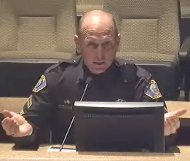1/21/2011
California: Another Red Light Camera Referendum PossibleMurrieta, California activists plan signature drive to put red light camera ban on the ballot.

The city council in Murrieta, California voted Tuesday to expand red light camera ticketing, and residents are not happy. Officials approved a three-year photo ticketing contract extension with American Traffic Solutions (ATS) and directed the private company to set up 24-hour video surveillance at each intersection. Local activists want to force a referendum onto the ballot to let residents decide whether those devices should be unplugged.
"I'm just so fed up with this," Diana Serafin told TheNewspaper in an interview. "It's the $500 fine and big brother watching you. To make an intersection safe, you need longer yellows and a longer all-red period. The city says they want the intersection safe, but cameras cause more rear end accidents. So I'm fighting back."
Serafin is basing her initiative petition on a slightly modified version of the language endorsed by 73 percent of voters in Anaheim, the only other California city to vote on automated enforcement. Serafin and her allies have a great deal of experience with the process having worked with the Limited Government Political Action Committee, a group that put three initiatives on the ballot to limit the pay, term in office and benefits for city council members. All three measures passed by large margins. For the red light camera ban to qualify for the ballot, about 5,000 to 6,000 signatures must be collected.
"I'm really confident that the people will sign," Serafin said. "The city council doesn't get it. They don't care. We're starting to stand up and fight back."
In a well-rehearsed presentation last night, Police Corporal Jay Froboese and Councilman Rick Gibbs spent more than an hour defending the use of cameras first installed in the city in 2005. Froboese vigorously denied that cost-neutral contract provisions violate the law, despite rulings in San Mateo (view ruling) and Orange County (view opinion) striking down provisions identical to those used in Murrieta. A pending federal court case is also exploring the issue while other rulings in Santa Ana questioned the legality of the evidence provided by the cameras (view ruling). Froboese explained that Murrieta has a comfortable relationship with the two Riverside judges who hear the camera cases and have taken judicial notice of the March 3, 2009 ruling People v. McLaughlin. This means the court will no longer hear any challenge to the contract.
"The two sitting judges that we have dealt with over the past five years on the Riverside Superior Court have both taken the contract to heart," Froboese said. "They have met with attorneys and with myself and every time the contract is found legal."
One resident insisted that the surveillance devices violated a much higher law.
"I don't need to remind you that you all took an oath to defend the Constitution," Francis Burns told the city council. "Because you are all constitutional officers, this issue is even more important for you... It's my belief that any government's number one priority -- whether it's state, federal or local -- is to preserve our civil, personal and economic liberties. Without those things intact, we have nothing left."
Red light cameras and speed cameras have been put to a public vote on fifteen occasions. Automated enforcement has never survived a referendum.


